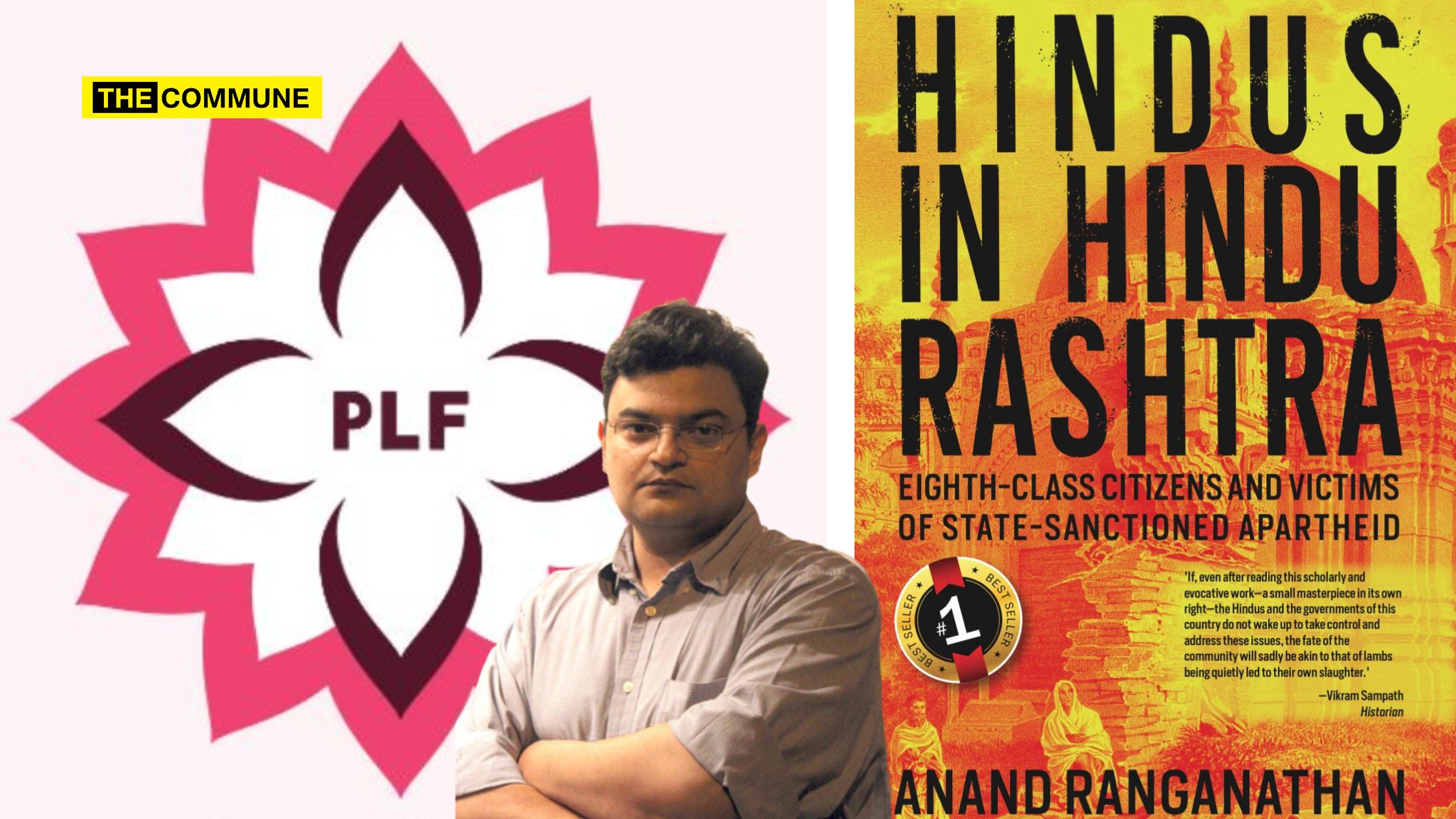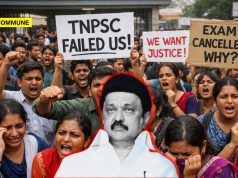
The first day of Pondy Lit Fest 2023 marked the launch of the book titled “Hindus In Hindu Rashtra – Eighth-Class Citizens and Victims of State-Sanctioned Apartheid,” authored by Prof. Anand Ranganathan. Remarkably, within just a month of its release, even without a formal launch event, the book went into its second print run. The author made a commitment to donate all the royalties from this book to organisations dedicated to the Hindu Refugee cause. To date, a total amount of ₹1.86 lakh has been donated to the Sewa Nyaya Utthan Foundation and Nimittekam on separate occasions. It’s worth noting that the book is published by BluOne Ink, which is also the Platinum partner for Pondy Lit Fest. The book currently ranks on top in the Politics category on Amazon India.
Book Discussion
The book launch was followed by a discussion and the panel comprised of Anand Ranganathan, the author, renowned historian Meenakshi Jain, advocate in the Gyanvapi mosque case, Vishnu Jain, and Ratan Sharda, a prominent ideologue of the RSS, moderated by Alo Pal.
Historian Meenakshi Jain brought in the historical perspective of institutionalised temple control. She spoke about the origins of temple control dating back to the British. She mentioned that the East India Company officials were fascinated by Indian temples and rituals. Warren Hastings, the first governor-general, regularly visited the Kalighat temple in Kolkata. Early Englishmen attended Rath Yatras in Orissa and participated in temple rituals, even praying for rain.
After independence, she said that rulers were expected to continue the tradition of valuing temples, but this did not occur. Factors contributing to this change included the rise of atheism, rationalism, and specific ideologies in South India. The perception of temple wealth led to misconceptions; most temples relied on agricultural land revenue.
The challenges in the contemporary era include: temple income declined due to land reforms encouraging tenants to occupy temple-owned agricultural land; prominent temples, like Brihadeshwar Temple, faced financial crises in 1983, impacting the conducting of temple rituals.
Meenakshi Jain placed her discontentment that political parties with Hindu nationalist leanings have not effectively addressed these issues to date.
Anand Ranganathan’s Turning Point
When asked by RSS ideologue Ratan Sharda about the turning point in his life, especially as an atheist, Anand Ranganathan replied that as a scientist, he was blissfully unaware in the past but gradually became aware of the issues plaguing Hindus over the past six to seven years. Two significant moments stood out he said: firstly, the shocking realisation of seven lakh Hindu refugees in their own country, and secondly, the Places of Worship Act, which highlighted injustices to our ancestors.
He emphasised that civilisations endured by seeking justice for their forefathers. He spoke about Meenakshi Jain’s work which painfully illustrated how our ancestors hid idols from the invaders, passing on their legacy to successive generations. Anand stressed that these issues concern the whole of India, not just Hindus, and he found it puzzling why non-Hindus in the country weren’t equally concerned.
Around five years ago, he said he studied the Allahabad High Court’s Ram Temple judgment, which exposed baseless claims made by quack historians. Recent excavations at Ayodhya confirm its Hindu heritage, and Anand underscored the importance of passing on this knowledge to the younger generation for heritage preservation. He encouraged people to reflect on these issues when visiting Mathura and Kashi and to appreciate Vishnu Jain’s unwavering efforts.
Remove Government Control – Ratan Sharda
Ratan Sharda expressed his thoughts on the topic of temple control. He acknowledged that the issue of temple management in India is a complex one with various types of temples, each requiring a different approach. We have family temples, Kola temples, village temples, and sampradaya temples, as well as larger temples controlled by a few pujaris, and some under government control. He said that the Hindu society lacked a centralised hierarchy to dictate how temples should be run or specific rituals performed. The solution likely involves removing government control and implementing appropriate guidelines for temple management, creating a kind of manual SOP to ensure the efficient running of all temples. He said that private temples, despite being visited by thousands, can sometimes be in deplorable conditions when managed by families. Finding a suitable solution is challenging, and discussions have been ongoing for the past three to four years, involving various acharyas and pramukhs. Establishing an apex body to oversee temple management is difficult, as it risks secularisation, potentially turning pilgrimage centers into tourist spots. He stressed that this issue represents a long civilisational battle, requiring time and effort to resolve. He also said that bringing Hindus together on a single point of agreement is quite challenging, even more than the 98 years of RSS’s existence. However, he noted that people are openly discussing these matters, reflecting the awakening within the Hindu samaj. Despite differences, when confronted with challenges to Sanatan Dharma, Hindus, including Jains (pointing to Vishnu Jain), unite, showcasing the resilience and unity of our ancient traditions.
Vishnu Jain On The Waqf Board’s Privileges
Advocate Vishnu Jain poured his heart out when asked about the Waqf Act in comparison with temple control by the government. He said that the issue of temple acquisition and the draconian provisions of the Waqf Act highlight the disparities in treatment between Hindu temples and other religious institutions in India. Regarding temple acquisition, he said that the government’s approach was flawed and that taking over temples was not a solution; instead, a common fund for offerings should be created to ensure transparency and accountability. He stressed that the government was taking over control mainly of the income that is generated by the sale of offerings. He stressed that government control only led to mismanagement and exploitation of temple resources.
The Waqf Act, on the other hand, grants significant powers to the Waqf Board, making it a parallel government. The amendments made by Rajiv Gandhi during his tenure allow for the declaration of properties as Waqf property without the affected parties’ knowledge – this was seen recently in a village in Tamil Nadu where an entire village including a 1000-year-old Shiva temple were announced as Waqf property. Vishnu Jain also heartbrokenly said that the Waqf Board also enjoys exemptions from limitations that apply to other citizens, enabling it to act without time constraints – something that is not given to Hindus in case of any legal disputes. He stressed that the unequal treatment of waqf properties compared to Hindu temples was unjust and discriminatory.
Meenakshi Jain intervened that it was essential to consider the historical context when discussing temple wealth and government control. In the medieval period, when temples were frequently demolished, there were instances where Hindus would visit the ruins and offer donations. However, the custodians (mutawalis) of these sites often allowed these offerings on the condition that they received all the donations, with no share going to the Hindu worshipers. This historical practice highlights that the issue of appropriation of temple wealth by custodians existed even when temple resources were relatively modest.
Anand Ranganathan reminded that PV Narasimha Rao, who despite all his successful measures, had brought two draconian laws Wakf Act and the Places of Worship Act. He remarked people like TR Ramesh (through Indic Collective Organisation), and J Sai Deepak were pioneers in this fight for breaking the control of the State over Hindu Temples. He added that though the donations are sizable amounts, the money through the land owned by Temple forms the lion’s share. He then posed a troubling question asking which is worse, “Controlling a temple or destroying a temple?”. He emphasised that all the issues addressed in the book should be widely read, as each of them serves as a clear indication that Hindus are treated as eighth-class citizens.
Click here to subscribe to The Commune on Telegram and get the best stories of the day delivered to you personally.




